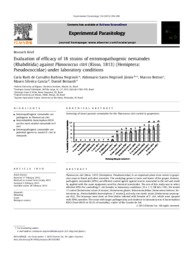Evaluation of efficacy of 18 strains of entomopathogenic nematodes (Rhabditida) against Planococcus citri (Risso, 1813) (Hemiptera: Pseudococcidae) under laboratory conditions.
Evaluation of efficacy of 18 strains of entomopathogenic nematodes (Rhabditida) against Planococcus citri (Risso, 1813) (Hemiptera: Pseudococcidae) under laboratory conditions.
Author(s): NEGRISOLI, C. R. de C.; NEGRISOLI JÚNIOR, A. S.; BOTTON, M.; GARCIA, M. S.; BERNARDI, D.
Summary: Planococcus citri (Risso, 1813) (Hemiptera: Pseudococcidae) is an important plant virus vector in grapevine crops in Brazil and other countries. The mealybug grows in roots and leaves of the grapes. Entomopathogenic nematodes (EPNs) are efficient control agents against insects associated to the soil and could be applied with the same equipment used for chemical insecticides. The aim of this study was to select effective EPNs for controlling P. citri females in laboratory conditions (25 ± 1 C, UR 60 ± 10%). We tested 17 native [Steinernema rarum (6 strains), Steinernema glaseri, Steinernema feltiae, Steinernema riobrave, Steinernema sp., Heterorhabditis bacteriophora (7 strains)] and only one exotic strain (Steinernema carpocapsae ALL). The bioassays were done on Petri dishes infested with females of P. citri, which were sprayed with EPNs juveniles. The strain with larger pathogenicity and virulence in laboratory was H. bacteriophora RS33 (from 69.0% to 92.2% of mortality), native of Rio Grande do Sul.
Publication year: 2013
Types of publication: Journal article
Unit: Embrapa Grape & Wine
Keywords: Cochonilha, Controle biológico, Praga de planta, Uva, Viticultura
Observation
Some of Embrapa's publications are published as ePub files. To read them, use or download one of the following free software options to your computer or mobile device. Android: Google Play Books; IOS: iBooks; Windows and Linux: Calibre.
Access other publications
Access the Agricultural Research Database (BDPA) to consult Embrapa's full library collection and records.
Visit Embrapa Bookstore to purchase books and other publications sold by Embrapa.

